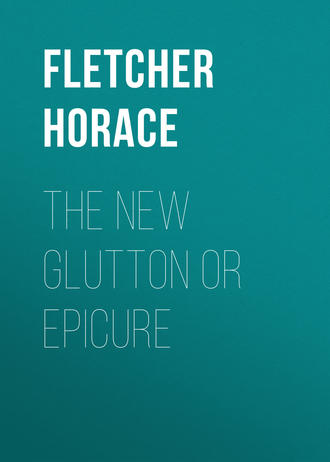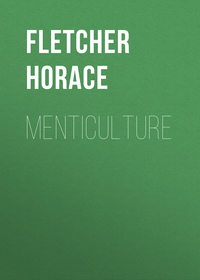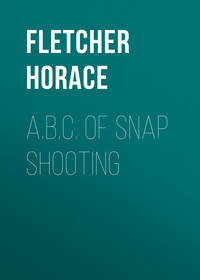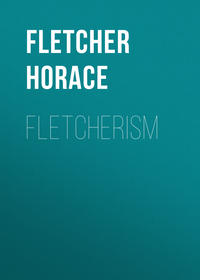 полная версия
полная версияThe New Glutton or Epicure
The hunger of the morning is necessarily but a habit-hunger. The best evidence of this is that, when busily employed, we forget it without trouble; and also is that European peoples, where the disease dyspepsia is not known in the list of physical derangements, perform the chief physical or mental effort of the day before their breakfast, the morning coffee scarcely meaning anything in the way of what we call a meal.
Dr. Dewey's firm assertion is that when the stomach has had a chance to "clean up" and is ready for more fuel, it will make it known in healthy manner by a healthy appetite, and that it is rarely normal before noon; and not really before one has done what might be called a "day's work."
I can assert boldly, as the result of experience, that the time to get work out of the brain is between the morning awakening and the first meal, and it is the same relative to endurance draughts on the physical strength.
Then, in the heat or the glare of the day, having accomplished something useful and disposed of pressing duties, so as not to feel the irritation of hurry, the first meal of the day can be taken with restful ease and it will be found that the supply demanded by the appetite will not be so great as that demanded by the unhealthful, habit-inflamed early morning call.
It may not seem so, but this digression from psychics to physics is very germane to my subject and to my own experience.
Without knowing that Dr. Dewey and the other eminent physicians who endorse his theories were living in the world, I, in the summer of 1894, blundered into a personal experience of diet that produced wonderful results which I now recall with all the vividness of the high lights of extreme pleasure met in foreign travel.
I was in a Southern city for two months during an unusually hot summer, watching some developments that could not be hurried, and the fruition of which was important to my interests. I had nothing to do in connection with this business but to "watch and wait."
I had some writing to do, however, in the mean time, which could not be well or comfortably done in the heat of the day, hence I arose at daylight and began to write. At that time of the morning nothing to eat was to be had, which compelled me to start work without it. My subject was an absorbing one, so that, once under way, I would not be diverted until I had "written myself out;" or in other words, had exhausted the consideration of the morning messages which I now designate "Spiritual Cerebration."
It happened, under these circumstances, that my habit-hunger was not given a hearing and it was nearly noon before I felt the fatigue or even the heat of the burning day, for I worked in my pajamas, and had no time to look at the thermometer, to get an exaggerated suggestion of heat by which to start my blood chasing itself through my veins.
I not only noticed that my midday breakfast was a deliciously grateful meal, but that appetite became satisfied far short of the formally customary abnormal early morning gorge, and, what was more remarkable yet, I wanted nothing during the rest of the day, and not even until midnight, except, after vigorous exercise of some sort, I might desire a little fruit or a bit of bread or cracker; but never a full course dinner.
I wore a belt at my trousers, as was the custom of the place, and in a few days decreased the girth of my corpulency one hole in the belt; and before the summer was over, four holes, with only the most comfortable feeling accompanying the loss of weight.
When my family returned from Europe, I settled back into the American and English habit of a meat breakfast, because I did not want to be "different," and at the same time I half doubted but that my experience was nothing more than an abnormal one, attributable to the inertia of summer heat, literary absorption and lack of physical exercise.
Twice, when I have been left alone since then, away from the restraint of custom, and also in the midst of abundant athletic exercise, I have again cultivated the same habit of missing breakfast through desire to do early morning work, with the same splendid results.
The last time referred to is the present. My search for a lost waif through the framing of an appeal for him, has given me such absorbing thought that meals have been of no consideration beside it, and in the midst of it I find Dr. Dewey's book, the books of the English physicians indorsing him; and have secured results of health, comfort and strength to myself which I did not know I possessed; to corroborate my accidental experience. As I said before, this seems a very wide digression from the psychical to the physical, but it is really no digression at all, for it is in the service of the brain, and the brain is the direct agent of communication between the Creator and our consciousness, assisting us to work together in the Nature-Man partnership with useful efficiency.
Now, let me return to the aim of my address, and pursue the thread of my personal experience in search of the fundamental principles of True Living, which, to be proven, must be vouched for and tested by resultant happiness.
When I attacked the tap-roots of trouble and shut the door in the face of anger and worry for ever, I saw among the bones of their decomposition the skeleton of fear. It proved to be their backbone. Fear, then, was the support of all the deterrent passions that beset brightest manhood and womanhood and pursue it to an untimely death.
My book "Happiness" deals with the separation of fearthought from forethought in order to show that it is possible to smother a vital stimulant of energy with a resemblance of it which is as deadly a poison as carbonic acid gas.
While I have been engaged in pursuing germs of disorder to their beginnings, during the past three or four years, I have uncovered many a beautiful possession that formerly I did not appreciate. Appreciation of the full value of Appreciation is one of these discoveries of priceless value and usefulness. I have spoken of this in "Happiness," but not as much as it deserves, for it truly is "The Appreciation of God and of Good that gives birth to Love, and which is the only true and adequate measure of wealth."
Nothing else, however, in the whole quest, has approached the beauty of the love for children that has come to me; the appreciation of them as Messages from the Creator, consigned to the cultivation of the environment society provides for them; as likely as not, any one of them bringing into the world a great intelligence by means of the humblest of parents.
During observation of social questions in Europe, my interest has been drawn constantly to children, as by a powerful magnet, so that when I was called back to this country to attend to a detail of business and met the adventure which is the cause of my present focalised interest in neglected ones, as expressed in a book to be called, when published, "That Last Waif; or, Social Quarantine,"19 it was but natural that I should put all the force of my sympathy into the cause of rescue, and that I should find in that service more happiness than in any of the luxurious amusements which had claimed me as a devotee in times gone by.
True happiness is the result of conscious usefulness. This I can assert with the confidence of knowledge, not alone from my own experience, but from observation of the great army of kindergartners and child-savers whom I have met in my travels, and especially within the past year; and it is evident that the service attaching to protecting little neglected angels from the evil suggestions and the cruel conditions that may make of them, not men, but beasts, is one of the avenues of usefulness in which these "Angels of the State" meet with the smile of the Master, who was the first Great Kindergartner; whose teachings centred about and dwelt upon the care of children as of first consideration, and who said, "Suffer Little Children to come unto me, and forbid them not, for of such is the Kingdom of Heaven."
Childhood has suffered, manhood has suffered, progress has suffered, for lo! these ages, the cruel assumption that mankind is naturally depraved. In recent years public conscience has been dulled by the anæsthetic that there must be a Have-To-Be-Bad Class in all communities. This has been formulated into the assumption that there is in every group of the Heaven-Sent Angels of Purity, a full ten per cent that must be depraved and unredeemable except by the interposition of special dispensation, which is a direct contradiction of all of the observed Laws of Creation to which intelligence now subscribes. The motto of this assumption is couched in this vicious legend: "The hopelessly submerged ten per cent stratum of society."
Half an hour's walk from this hospitable mansion, on the shore of the beautiful Geneva Lake, is a place called "Holiday Home." There are now housed and thoughtfully cared for at the "Home" about one hundred of the "Hopelessly Submerged Ten Per Cent Stratum of (Chicago's) Society." During the summer half a thousand of these unfortunates will come for two weeks each. When we touched at the wharf last evening after coming from the concert given in their interest at Mr. Chalner's lakeside home, the waifs met us with a merry class-yell, and greeted us with an intelligence, a buoyancy, and a freedom, born of their holiday, such as was not excelled at any of the other landings where only the children of rich summer residenters were met. We all saw these "waifs" and we marvelled at them, for, with the grime of the slum washed from their sweet faces, and with clean, though sometimes ragged clothing, they might have figured in the mix-up of "Pinafore," or have starred in a dramatic representation of the "Prince and the Pauper," with all the grace required of princelings.
They haven't been long from God, and they are god-like or not, as we have welcomed and protected them, or rebuffed or neglected them.
Let me assure you in the most practical way that there are two sides to this child question. There is a sentimental side, than which there is no other so worthy; and there is a practical side, than which there is none so profitable.
The best and most profitable service in the whole gamut of useful occupations that I know about is in learning to know children, and in connection with a Quarantine movement which is now started, and which aims to not let one of these wards of the Christ escape the best care known to Love and the Science of Child-Life.
The crèche and the kindergarten and the manual training schools, and domestic training classes, as well as institutions similar to the "Holiday Home" across the Bay, have demonstrated within the past thirty years that fully ninety-eight per cent of the "Hopelessly Submerged Ten Per Cent" can be rescued after they have been warped by evil surroundings. What will not the same effort effect if directed toward prevention and protection, instead of being squandered in careless and soulless correction?
Christ said: "And a little child shall lead them." Let us awake to the call. It is the way to Heaven; for, "Of such is the Kingdom of Heaven."
FIVE YEARS' CONFIRMATORY EVIDENCEThe spirit of the preceding address to the good members of the Unity League organisation on the shores of beautiful Lake Geneva has been the inspiring motive of the quest for scientific endorsement of Economic Nutrition for the benefit of the present generation of children, and, incidentally, of their elders. In Economic Nutrition lies protection from sexual morbidity, alcoholic intemperance, bodily disease, savage passions and all the brood of evil contamination and temptation. In Economic Nutrition lie possibilities of physical and mental energy and optimistic happiness such as the world has not been accustomed to in the memory of history. Economic Nutrition is what children want to be taught with their first indelible impressions, and the present great movement of which this little book treats, for which it was first responsible, and for which it is republished in a new and extended edition, is expected to furnish authoritative knowledge relative to the most Economic Nutrition, so that mothers and kindergartners may meet the little waifs from the Creator on the threshold of this present life with words of wisdom and examples of sanitary perfection, instead of confronting them at once with the poison of ignorance relative to their most important concern, – their own Economic Nutrition.
That the contentions uttered in "That Last Waif; or, Social Quarantine," referred to in the Lake Geneva Address, are reasonable is evidenced by the experience of Dr. and Mrs. Kellogg and their adopted family of twenty-four waifs, the acquaintance of which has since been made.
All of the altruists who have engaged in kindergardenry among the neglected, Dr. Barnardo, Dr. Kellogg and the rest, are full of confidence in the possibility and efficacy of a perfect quarantine as outlined in "That Last Waif." It is an Epicurean method of promoting Menticulture, killing Fearthought, denouncing Gluttony, saving that Last Waif, and attaining Happiness through learning the A.B. – Z. of Our Own (Economic) Nutrition.
GIVE THE BABIES A CHANCE
THE INSPIRING MOTIVEThe enthusiasm excited by a persistent study of the problem of human nutrition is inspired by the need of an intelligent scheme of information and instruction which may be understood by mothers and teachers for the benefit of children. Unlike the young of the lower animals, the babes of mankind have some years of dependent existence during which much unconscious murder is committed, and during which the innocents are more or less poisoned with bad suggestions that weaken them all through life. Colts, calves, pigs, chickens, and the like survive the period of dependence in much greater proportion than do the young of their human masters survive the infantile stage of existence, and this is largely due to the lack of basic or parent knowledge on the part of mothers relative to their own nutrition, and also a pitiable ignorance concerning the nutrition of their children, the double ignorance constituting a double crime.
Even if careless about ourselves, is it not shameful that we do not concentrate effort in learning the truth about our instinctive means of protection in our own alimentation and in classifying the knowledge in a way that will make it available to children, through their proper guardians, when they arrive in the world "as helpless as a babe"?
If knowledge which seems to be protective had not been evolved out of recent experiment, or if the hope of gaining such knowledge had not been collected from good authority, the appeal might seem futile; but this is not the case. The most intelligent and studious investigators are united in the belief that the problem can be scientifically solved and the confusion of ideas settled by concentrated personal and collective study of economic nutrition, through observation of the natural requirements, and by trial of the care in taking food which is necessary to secure the most profitable economies.
ILLUSTRATIONHere is an illustration, both of the present need of better knowledge and the hope of its attainment. It is an account of one accidental experience which showed that excess of food may be as detrimental to a tiny baby dependant, as it is generally conceded to be harmful to grown persons. The case was described by Dr. Chadwick of Boston to Professor Bowditch, and by the latter repeated to the author. An infant was not progressing as it should and failed to gain normally in weight. It was under the charge of a nurse and was being carefully watched. A certain quantity of milk was prescribed for daily nourishment, at prescribed times, in a prescribed manner; but the child did not increase in weight and was "doing poorly." For some reason the nurse was changed and instructions were repeated by the old to the new nurse. In the course of a week the little patient showed signs of marked improvement, both in gain of weight and in general condition. In order to record the particulars of the change the physician questioned the nurse and learned that only one half the nourishment originally prescribed had been given, the new nurse having forgotten or misunderstood the orders.
The reason the little fellow had been "doing so poorly" under the original prescription was because he had been using up his puny strength getting rid of the excess of food that had been forced upon his little stomach and intestines. When the excess was stopped, so that his digestive apparatus could occupy itself with his real needs, the babe had a surplus of energy for growth and thrived as a rightly nourished child should do.
Note: In connection with the foregoing, reference is invited to the author's conception of how attention to one's personal economies, beginning with the economy of personal nutrition, is interrelated to general menticulture and the child-saving phase of our personal responsibility in child culture. Even if we are carelessly suicidal ourselves, we owe better care to innocent and dependent children. This will be found in the "Explanation of the A. B. C. Life Series" at the end of the book.
MUNCHING PARTIES AND THE CHEWING FAD
To the scientific person of ultra conservative bent of mind this free and easy screed, offered as the exponent of a great economic idea, will seem offensive, and justly so; but it has been written with a purpose, and happily the purpose is being effected as speedily as the author hoped for when his own discovery relative to the profitableness of an epicurean, economic nutrition became a reality of experience and suggested publication.
To this free presentation, couched in a variety of class expression, is due, in a large measure, the new revival of feeding reform which has spread far over the civilised world, where it was most needed, within the past five years.
Up to five years ago, and to some extent now, the prescription method of recommending diets was and is common. In fact it was universal up to a few years ago; for no one, as far as is known, had yet suggested that normal appetite was the only competent prescriber, and that it was the office of the physician to teach his clients and patients how to normalise the appetite.
It required two years of the circulation of the original publications and the constant, persistent, personal assertion of the author before any continued credence of his assertions was secured, with the one exception of a lay friend in New York who happened to be in a state of great need of reform at the time, as related under the heading of "A Five Year's Lay Experience."
It was only about two years ago that the new claims had received sufficient recognition to admit of explaining them to busy men of prominence in the medical profession. After the confirmation at the laboratories of the University of Cambridge, England, the author had an opportunity to make a statement and give a demonstration to Sir Thomas Barlow, the private physician of King Edward VII. Sir Thomas was most sympathetic with the physiological possibilities, and there has been frequent evidence since to show that he pursued thought of the suggestions, and that his interest has been responsible for the aristocratic lay interest which originated the so-termed "Munching Parties" in London.
The English term "munching," signifying chewing or masticating, is an excellent amendment, which is gladly adopted. "Masticating" is technical and formal. "Chewing" has been disgraced by its application to gum and to tobacco, and the other English expression, "biting," suggests the carnivorous, savage use of the jaws and teeth, while "munching" implies enjoyment, as the munching of delicacies by children.
As reported from London, "Munching Parties" were inaugurated to teach attention, to encourage mouth preparation of food for digestion, and also for the æsthetic purpose of gaining all the gustatory pleasure possible from food while conserving the economies of nutrition. The method employed was most ingenious, and with some modification is approved by the author. When a course was served at "Munching Lunches," the manager of the ceremony employed a stop watch to time the treatment of the first morsel of food taken by each of the guests. Five minutes was prescribed for consideration of the morsel. It was an extravagantly long delay over any one morsel, but it set the pace of deliberation, and time, under the circumstances of a social function, was not a matter of moment.
A five minute, or even a one minute consideration of a morsel of delicious food, tends to give a new appreciation of its taste value and suggests more careful enjoyment than is usual when nervous conversation is the main business of a meal and food is a mere accompaniment.
Industrious munching performs about one hundred acts of mastication to the minute, and from twelve to fifteen mouthfuls of ordinary food is sufficient to satisfy completely a hearty appetite. Tender or well-prepared or well-cooked food is fully treated by munching for natural swallowing in even much less time than a minute. The necessary time ranges from one-twentieth to one-fifth of a minute, or ordinary food is reduced so as to excite the natural Swallowing Impulse by from five to twenty masticatory acts; and this applies equally to the tasting movements required by sapid liquids. Hard or coarse breads, and even potato, may require more attention and longer time, and deficiency of saliva delays the process; but it is a very refractory food that will require more than half a minute to the ordinary mouthful. Small sips and small mouthfuls demand less proportionate time, so that the actual time necessary to satisfy a good appetite does not exceed twelve or fifteen or at most twenty minutes when the secretion of saliva is ample, as in the case of real hunger; but the enjoyment of taste does not stop short with the actual cessation of the psychological sensation. The memory of taste continues after the actual sensibility has ceased, and one of the most agreeable compensations of a meal is enjoyed in the form of complete satisfaction following the act of eating. It is a very different and a very much more agreeable sensation than that attending a distended stomach, and must be felt and understood to be fully appreciated.
"Munching Party Functions," then, reveal more possible pleasure and benefit than the mere tickling of the palate, so-called, and diffuse their benefits to cover the mechanical act and a long-continued feeling of satisfaction that is more subtly pleasing than the immediate physiological cause of the contentment.
The "Munching Party" scheme of education and enjoyment has been carried to America, and has received the name of the "Chewing Fad." As such it has been cartooned in the newspapers, but in no matter what form the suggestion is spread it can do only good.
Appreciation of the suggestion has been generously expressed in the letters of Dr. Kellogg of the great Battle Creek Sanitarium and by Dr. Dewey, the author of the "No Breakfast Plan," as well as by the author's intimate colleagues, Drs. Van Someren and Higgins, of Venice, Italy.
There are many physicians from whom the author has heard report, and perhaps thousands who have not yet been heard from, who are conveying the slow-eating and appreciative-attention suggestions to their patients; and as the reform in dietetic technique has sprung up since the publication of the booklets of the author – "What Sense? or, Economic Nutrition," and "Nature's Food Filter; or, What and When to Swallow," which were afterwards coupled together under the title of "Glutton or Epicure" – he has good reason to suppose that the spread of the idea originated with the publication of his discovery even where the personal influence had not been given direct.
While visiting recently in Cambridge, Massachusetts, the author met a distinguished professor of Harvard University who had been suffering from nervous prostration. He had spent some time in Europe consulting the most eminent neurologists, but with little or no relief. On his return to the United States he was advised to go to a sanitarium in Bethel, Me., under the direction of Dr. Gehring, where effective cures of cases of nervous prostration have been performed. The professor was given "Menticulture" and "Glutton or Epicure" to read, and was recommended to practise the advice of the books in connection with his treatment. These two books are an account of the way the author promoted his own salvation from the uncertainty relative to physical health and mental control, and it is by these means that the psychic, mechanical, and chemical necessities of nutrition are satisfied.





